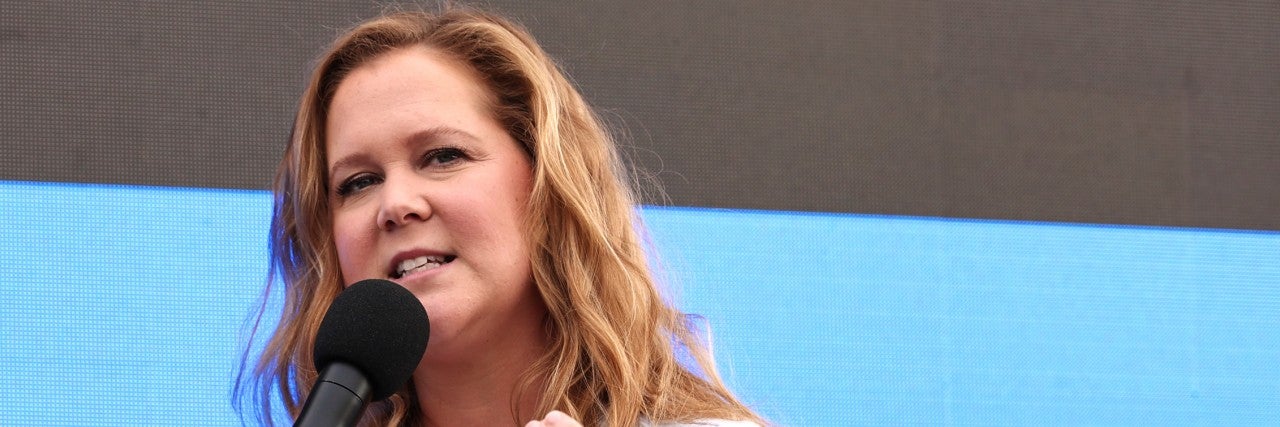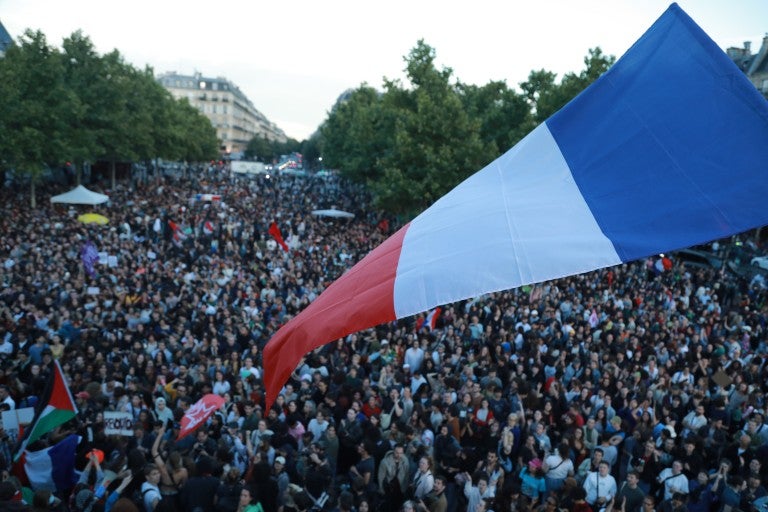September 2, 2021
There was nothing funny about comedian Amy Schumer’s recent Instagram post about antisemitism in America. The comedian’s screenshot of a tweet about the troubling finding in the recently-released 2020 FBI hate crime statistics has garnered more than 4,800 comments that reflect even more alarming trends about the spread of Jew-hatred, the motives behind it, and the impact it has on Jews around the world.
The tweet shared by Schumer to her 10.8 million Instagram followers was originally posted by Avi Mayer, AJC’s Managing Director of Public Affairs and Senior Spokesman. On the same day the FBI issued the report, Mayer tweeted: “The @FBI just released its hate crime stats for 2020. Read this statistic very carefully: Of all hate crimes motivated by hatred of the victims due to their religion, 57.5% targeted Jews. Jews make up less than 2% of the U.S. population.”
(The FBI has since reissued its 2020 numbers after a late submission and updated this statistic from 57.5% to 54.9%)
Celebrities such as Mandy Moore, Sophia Bush, Lea Thompson, Ilana Glazer, Jake Cohen, Loren Brovarnik, and Joey King joined Schumer in expressing dismay about the findings.
But the comments also provided a glimpse of how people on social media view the rise of antisemitism around the world. Below are comments that are representative of the various trends present among the 4,800 comments on Schumer’s post.
- Outrage! (finally) Celebrities spoke up.
“Thanks for posting because no one else will.”
“It’s really nice to see you calling attention to this! I’ve had friends tell me it isn’t true when I’ve them and people are oblivious to how bad it is….”
“Thank you for sharing this. It’s been ignored for too long.”
“My 87-year-old stepdad is a Holocaust survivor. The insanity and hatred is unbelievable.”
A majority of the comments joined Schumer in expressing dismay. Many of the comments specifically thanked her for speaking out amid silence from others with large social media followings.
Indeed, despite ample evidence that rising Jew-hatred is a severe and growing program in America, very few celebrities with large social media followings are speaking out against antisemitism.
According to the largest-ever survey of U.S. Jews, AJC’s Antisemitism in America Report 2020, nearly nine out of ten (88%) believe antisemitism is a problem in the U.S. today and more than four out of five (82%) believe it has increased over the past five years.
- Denial! Some commenters doubted statistics or said Jews manipulated data.
“I don’t believe that statistic.”
“…I call bullsh*t on this stat.”
“I’m saying I’d like to see the actual statistics the FBI ‘posted’ or released. I think the whole thing is a BS meme. I’m not saying I’m right. Just saying, show me proof.”
The perception gap between American Jews and the general public is real.
While AJC’s State of Antisemitism in America Report found that 82% of American Jews believe hatred against them has been on the rise, it found that only 43% of Americans agree.
Perhaps most shocking was the finding that nearly half of the general public are either unfamiliar with the term “antisemitism” or are unsure what it means. When asked, though, if a Jewish person or organization’s belief that a statement or idea was antisemitic would cause them to agree, 65% said it wouldn’t change their mind.
But the reporting gap is real, too. While more than one in three American Jews (37%) say they have been the victims of antisemitism over the past five years, 76% of those targeted did not report the incident to authorities, journalists, social media, or Jewish organizations.
- Minimize! Some acknowledged damning report but downplayed its severity.
“Lol how does this have anything to do with the rest of us? Sounds like a you problem.”
“But the reality is that no one is actually killing Jews… Black people are being slaughtered every single day.”
It’s important to recognize how antisemitism is a danger to democracy. It’s not only a Jewish problem; it reflects the declining health of our society. It’s not an either/or.
That’s why AJC has convened alliances with advocates across the spectrum – with American Latinos, with Black Americans, with Asian-Americans, with American Muslims, and a host of other interfaith partners -- to encourage more accurate reporting of hate crimes. In fact, earlier this year AJC and its intergroup partners celebrated the passage of the long-sought Jabara-Heyer NO HATE Act, which aims to improve hate crimes reporting and governmental responses to hate.
If not all Americans are able to identify the patterns that point to the precipitous rise of antisemitism in the U.S., they will be unable to stop its spread and the damage it does. Hatred and persecution against one group of people is an affront to all.
- Fear! Some American Jews shared how rising antisemitism has impacted their daily lives.
“I make sure to NOT tell anyone that I’m Jewish. I always get asked if I am (which is extremely rude) and I used to year bc why I be ashamed. Now, I say no.”
“Terrible. This is why we didn’t choose our Synagogue preschool program. We feared our children could be targets because of their faith.”
In AJC’s State of Antisemitism in America Report, one quarter of Jews said they avoid publicly wearing or displaying things that might identify them as Jewish. Meanwhile, 31% of American Jews say they avoid certain places, events, or situations out of concern for their safety.
More than 56% of American Jews say their Jewish institutions have upgraded security since the Pittsburgh synagogue attacks. Read more about Jewish Americans’ personal experiences with antisemitism.
- It’s Their Fault! Commenters pointed fingers at their political opposites.
“It’s definitely the liberals. Christians love the Jews [and] never harmed them as [severely] as the cruel [godless] left wing. It’s sad. NOT GOOD.”
“Makes me so mad, we can thank the MAGA crowd.”
Commenters from the right and the left used the FBI findings as an occasion to point fingers at the other. But the truth is, efforts must be made to combat antisemitism on both sides of the aisle. Those who call out antisemitism on only one side of the political spectrum weaponize Jew-hatred to advance their own political goals.
Whether it’s those on the far left who sometimes hold the only Jewish-majority nation to a double standard, or those on the far right who compare vaccine mandates to the Holocaust, or white supremacists chanting “Jews will not replace us,” the threat is ever-present and must be condemned by those on both sides of the political aisle.
- Out of the woodwork! Antisemites emerged.
“How do you know if those statistics are all made to make Jews feel victims lol you all been faking being victims. #freepalestine.”
“Let’s get it up to 80%.”
“How many of them are Zionists tho.”
“Palestine”
“Maybe stop being mean to the Palestinians and people would like you more.”
“Well if they weren’t owning everything people wouldn’t have an issue. You can’t owned the whole music industry and then pollute it without people clapping back it’s just come on.”
In May, following the conflict between Israel and terrorist groups in Gaza, some Jews were physically attacked and threatened on the streets of major American cities. Some anti-Israel protesters chanted antisemitic slogans.
On social media, commenting “Palestine,” “Free Palestine,” or an emoji of the Palestinian flag on posts written by Jewish people that have nothing to do with the Israel-Palestinian conflict has become a popular antisemitic spamming tactic on social media.
The International Holocaust Remembrance Alliance’s Working Definition of Antisemitism is a clear and compact description of antisemitism in its various forms, including where and how anti-Israel animus can become a form of antisemitism, separate and apart from criticism of Israel. For instance, holding Jews collectively responsible for actions of the state of Israel, as commenters did repeatedly, is antisemitic.
AJC also created Translate Hate – a glossary of nearly four dozen antisemitic tropes, many of which appeared as comments below Schumer’s post. Commenters trafficked in antisemitic charges of dual loyalty by questioning a Jewish American’s trustworthiness or loyalty to the U.S., implying that Jews who are Zionists, or support Israel’s right to exist, deserve to be persecuted. They also espoused stereotypes of Jewish greed, control and economic antisemitism.

